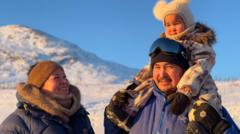The cold, serene beauty of Greenland clashes with the intrusive shadow cast by Donald Trump’s controversial statements regarding the territory’s sovereignty.
Donald Trump’s Rhetoric Fuels Tensions in Greenland

Donald Trump’s Rhetoric Fuels Tensions in Greenland
As President Trump’s remarks about Greenland echo, residents express their staunch desire for autonomy.
The pristine landscape of Greenland, with its majestic ice-capped mountains and tranquil fjords, stands in stark contrast to the uncertainty stirred by comments from incoming U.S. President Donald Trump. His nonchalant mention of possibly acquiring Greenland has sparked a wave of conversations among its residents, many of whom echo a message of sovereignty: "Greenland belongs to Greenlanders."
On a chilly day of -16C (3F), with the wind chill dropping the temperature to a biting -27C, I journey to the remote settlement of Kapisillit, where only about 40 residents persist in their traditional ways of life. Here, local church elder Kaaleeraq Ringsted, aged 73, embodies the sentiments of many. His laughter fades when the topic of Trump's intentions arises. "It is not acceptable that he says this. Greenland is not for sale," he asserts, reflecting a dedication to preserving the values instilled by generations before him.
Our boat's journey through the icy waters leads us to Angutimmarik Hansen, a farmer and hunter who also relies on imported feed from Denmark to sustain his livestock. Jokingly nodding towards his collection of hunting rifles, he quips, "Those are in case there's an invasion." Yet beneath the humor, his frustration bubbles over: "What a stupid person in the world like Trump," he states emphatically. "Never will we sell Greenland."
While many locals maintain a skeptical stance towards the U.S.'s interest, they express a willingness to foster warm relations with the American populace, distinct from the contentious politics exemplified by Trump. Recently, Trump’s son, Donald Trump Jr., visited Nuuk, where he received a polite reception but left citizens contemplating the implications of his father's rhetoric.
Local businessman Jorgen Boassen, a staunch supporter of the Trump family, regarded the visit favorably, expressing hope for future trade relations. Yet, residents like Kuno Fencker, an MP pushing for greater independence, emphasize the urgent need for Greenland to negotiate on its own terms with the U.S. rather than through Denmark.
This quest for sovereignty brings to light fears about economic stability amid negotiations, as Greenland's economy heavily relies on subsidies from Denmark. Campaigners vocalize that independence must come with a sustainable plan for defense and development.
The media landscape reflects a dichotomy in approaching Greenland's future. Maasana Egede, editor of the local newspaper, advocates for a nuanced discussion beyond the binary debate of independence, where living standards and trade remain central principles for most residents.
The local leadership's resoluteness was evident when Greenland’s Prime Minister Mute Egede publicly stressed their identity in a joint press conference with Danish PM Mette Frederiksen, a calculated response aimed at balancing diplomatic relations while asserting a distinct Greenlandic future.
Historical grievances with Denmark linger, with tragic narratives haunting interwoven relationships. Maliina Abelsen, a former finance minister, emphasizes the necessity for acknowledgment of past injustices before Greenland can truly move forward. She articulates a collective experience of enduring racism that continues to shape social dynamics in contemporary Greenland.
As history unfolds, the impact of Donald Trump's provocative words cannot be understated; the stakes of self-determination are palpable. Across this ethereal landscape, the call resonates for Greenlanders to shape their own destiny — a testament to a resilient community resolutely engaged in defining their own path.























